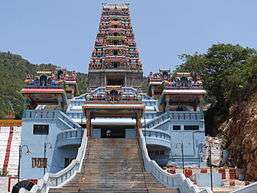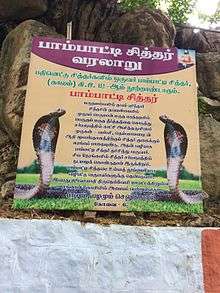Marudhamalai (temple)
| Arulmigu Subramaniyaswami Thirukovil, Marudhamalai | |
|---|---|
 | |
 Arulmigu Subramaniyaswami Thirukovil, Marudhamalai Location in Tamil Nadu | |
| Geography | |
| Coordinates | 11°2′46″N 76°51′7″E / 11.04611°N 76.85194°ECoordinates: 11°2′46″N 76°51′7″E / 11.04611°N 76.85194°E |
| Country | India |
| State | Tamil Nadu |
| Location | Coimbatore |
| Culture | |
| Primary deity | Murugan |
| Architecture | |
| Architectural styles | Dravidian |
| History and governance | |
| Date built | 12th century |
| Website | www.marudhamalaimurugantemple.org |
Subramaniyaswami Temple, Marudamalai is a popular 12th century hill temple dedicated to Hindu god Murugan, situated near Coimbatore, Tamil Nadu, India. It is considered as 7 House of Lord Murugan.[1] Like most Murugan temples, the temple is situated upon a hillock, part of the Western Ghats about 12 km west from the city of Coimbatore. Thai Poosam and other Murugan festivals are celebrated.[2]
Architecture
The temple is atop a 600 ft (180 m) tall granite hill in Coimbatore. The presiding deity is addressed by multiple names like Marudhamalai Andavar, Marudachalapathi and Dhandayuthanpani. There are various water bodies around the temple, namely Maruda Theertham and Snake charmer's spring, which is believed to possesses medicinal properties.[3]

Paambatti Siddhar
In Southern end of the temple pragaram staircase to the pambatti siddhar cave is located. pambatti siddhar is one of the 18 siddhas. He lived during the 12th century. pambatti siddhar penanced in the marudhamalai hill. Due to his high penance, Lord murugan appeared like snake to him. Lord Murugan gave siddhar, marudha theertham and blessed him with his wife Valli and Dheivaanai. A connecting tunnel route from Lord murugas sannidhi and siddhar's cave was formed and siddhar used it and worshipped god. Some times he will transform into snake and roam around the temple.
References
- ↑ Subburaj, A (27 September 2015). "Domestic tourism flourishes in Coimbatore district". Times of India. Retrieved 9 March 2016.
- ↑ "Thai Poosam celebrated with fervourt". The Hindu. 4 February 2015. Retrieved 9 March 2016.
- ↑ V., Meena. Temples in South India. Kanniyakumari: Harikumar Arts. p. 20.
| Wikimedia Commons has media related to Maruthamalai Temple. |
